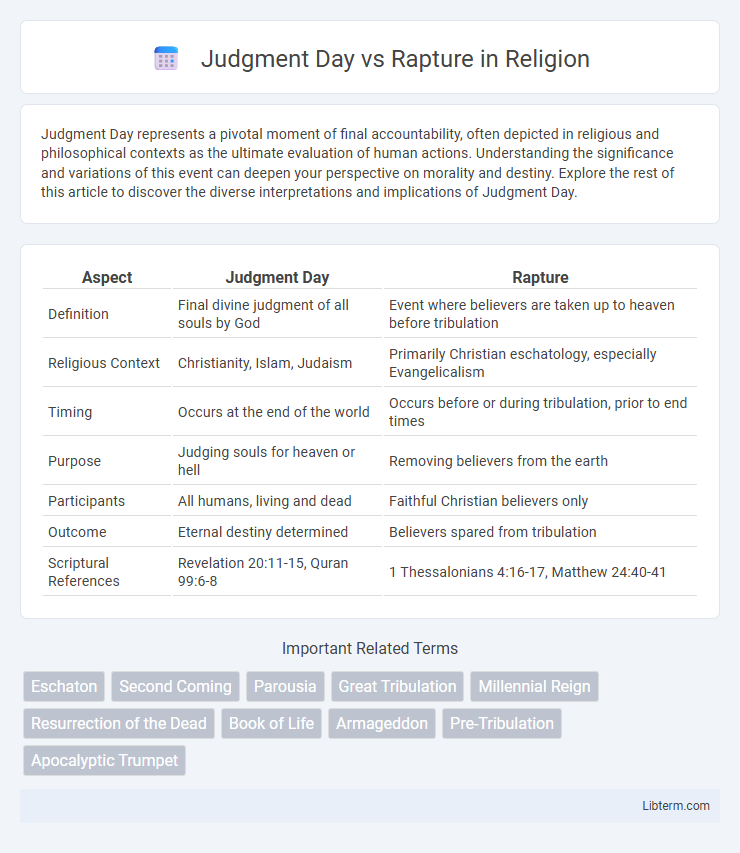Judgment Day represents a pivotal moment of final accountability, often depicted in religious and philosophical contexts as the ultimate evaluation of human actions. Understanding the significance and variations of this event can deepen your perspective on morality and destiny. Explore the rest of this article to discover the diverse interpretations and implications of Judgment Day.
Table of Comparison
| Aspect | Judgment Day | Rapture |
|---|---|---|
| Definition | Final divine judgment of all souls by God | Event where believers are taken up to heaven before tribulation |
| Religious Context | Christianity, Islam, Judaism | Primarily Christian eschatology, especially Evangelicalism |
| Timing | Occurs at the end of the world | Occurs before or during tribulation, prior to end times |
| Purpose | Judging souls for heaven or hell | Removing believers from the earth |
| Participants | All humans, living and dead | Faithful Christian believers only |
| Outcome | Eternal destiny determined | Believers spared from tribulation |
| Scriptural References | Revelation 20:11-15, Quran 99:6-8 | 1 Thessalonians 4:16-17, Matthew 24:40-41 |
Understanding Judgment Day and the Rapture: Key Differences
Judgment Day and the Rapture are distinct concepts in Christian eschatology, where Judgment Day refers to the final divine evaluation of all souls, leading to eternal reward or punishment. The Rapture involves the sudden gathering of believers to Christ before a period of tribulation, emphasizing salvation and protection from forthcoming trials. Understanding these differences clarifies eschatological timelines and theological interpretations within various Christian doctrines.
Biblical Foundations: Scriptural References for Both Events
Judgment Day is extensively detailed in Revelation 20:11-15, describing the final judgment where all the dead stand before the Great White Throne to be judged according to their deeds. The Rapture is rooted in passages such as 1 Thessalonians 4:16-17 and 1 Corinthians 15:51-52, emphasizing the sudden catching up of believers into the air to meet Christ. Both events are anchored in eschatological themes but serve distinct purposes within Biblical prophecy.
Theological Interpretations Across Christian Denominations
Judgment Day and the Rapture hold distinct theological interpretations across Christian denominations, with Judgment Day viewed as the final divine evaluation of all souls, while the Rapture is seen by some Evangelical groups as the sudden gathering of believers before tribulation. Catholic and Orthodox traditions emphasize the universal, singular Judgment Day tied to Christ's second coming, contrasting with many Protestant teachings that highlight a pre-tribulation Rapture event. These differing eschatological views influence doctrines of salvation, afterlife, and the ultimate restoration of creation in Christian theology.
Sequence of Events: Which Comes First?
The Rapture occurs first, marked by believers being taken up to meet Christ in the air, while the Judgment Day follows later, involving the final judgment of all humanity. The Rapture initiates the end-times sequence, leading into the Tribulation and culminating in the Second Coming of Christ. Judgment Day then serves as the ultimate event where souls are judged, determining their eternal destiny in heaven or hell.
Signs and Prophecies Leading to Judgment Day and the Rapture
Signs and prophecies leading to Judgment Day include widespread moral decay, natural disasters, and the rise of the Antichrist as described in biblical texts like the Book of Revelation and Daniel. The Rapture, often associated with 1 Thessalonians 4:16-17, is preceded by signs such as increased global turmoil, false prophets, and a great falling away from faith among believers. Both events emphasize imminent divine intervention but differ in timing and the sequence of eschatological occurrences.
The Role of Jesus Christ in Both Events
Jesus Christ serves as the central figure in both Judgment Day and the Rapture, acting as the divine judge and establisher of eternal destinies. During Judgment Day, Christ returns to execute final judgment on all humanity, separating the righteous from the wicked based on their faith and deeds. In the Rapture, Jesus actively gathers believers, both living and resurrected, to meet Him in the air, marking the beginning of the end-times sequence.
Common Misconceptions About Judgment Day and the Rapture
Judgment Day and the Rapture are often confused, but they represent distinct events in Christian eschatology with different theological implications. A common misconception is that the Rapture marks the final judgment; however, it is described as the moment believers are caught up to meet Christ, preceding the tribulation period. In contrast, Judgment Day refers to the ultimate divine assessment of all souls, occurring after the resurrection and final return of Christ.
Impact on Christian Eschatology and End-Times Beliefs
Judgment Day represents the final divine evaluation of all souls, shaping eternal destinies and reinforcing accountability themes within Christian eschatology. The Rapture involves the sudden gathering of believers, emphasizing hope and imminent transformation in end-times beliefs. Both events profoundly influence doctrinal interpretations of salvation, resurrection, and the fulfillment of prophetic scripture.
Global Cultural and Societal Perspectives
Judgment Day and the Rapture represent distinct eschatological events influencing global cultural narratives and societal behaviors across religious traditions, notably Christianity and Islam. Judgment Day, often depicted as the final divine assessment of souls, shapes moral frameworks and legal systems by emphasizing accountability and eternal consequences, while the Rapture, primarily a Christian concept involving the sudden gathering of believers, fosters communities centered on hope, preparedness, and spiritual vigilance. These contrasting eschatologies impact global art, literature, and social movements, reflecting diverse interpretations of fate, justice, and human destiny within multicultural contexts.
Preparing Spiritually: Responses to Judgment Day vs. the Rapture
Preparing spiritually for Judgment Day involves sincere repentance, steadfast faith, and continuous self-examination to align one's actions with divine commandments. In contrast, readiness for the Rapture emphasizes maintaining a living hope through constant prayer, holy living, and vigilance for Christ's imminent return as described in New Testament scriptures. Both eschatological events call for deep spiritual commitment, but Judgment Day focuses on accountability for all deeds, while the Rapture centers on personal readiness and sanctification before being caught up to meet Christ.
Judgment Day Infographic

 libterm.com
libterm.com